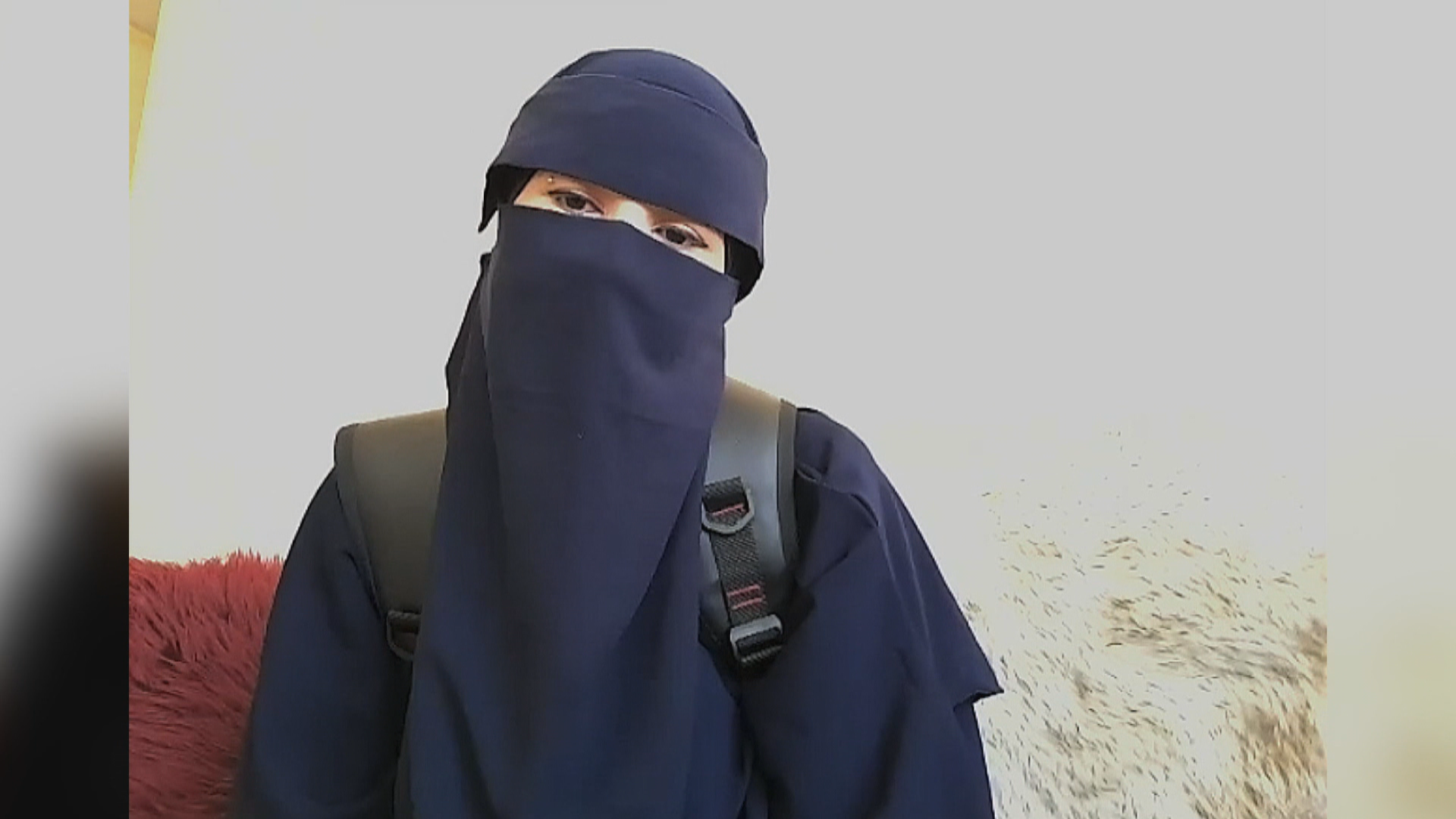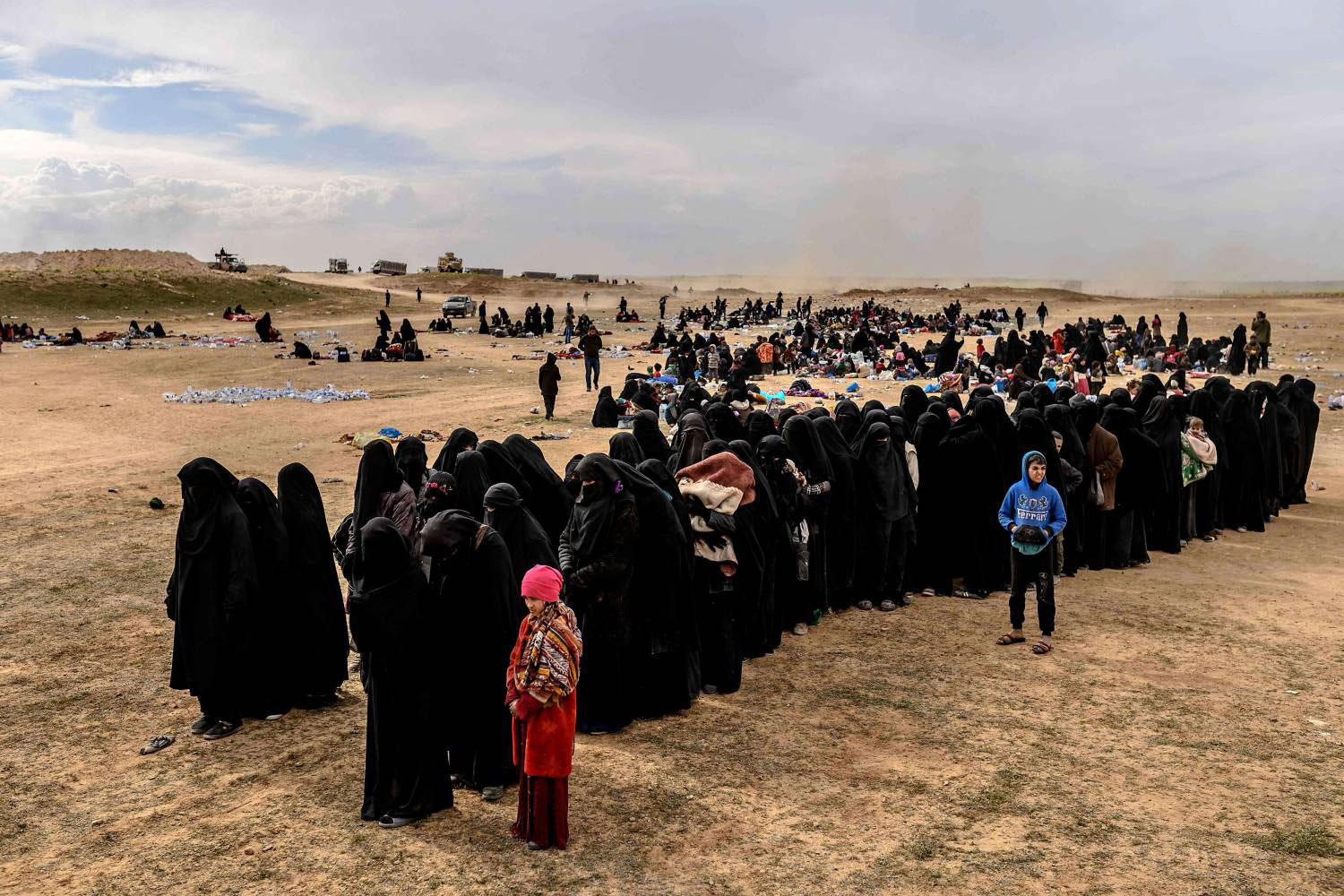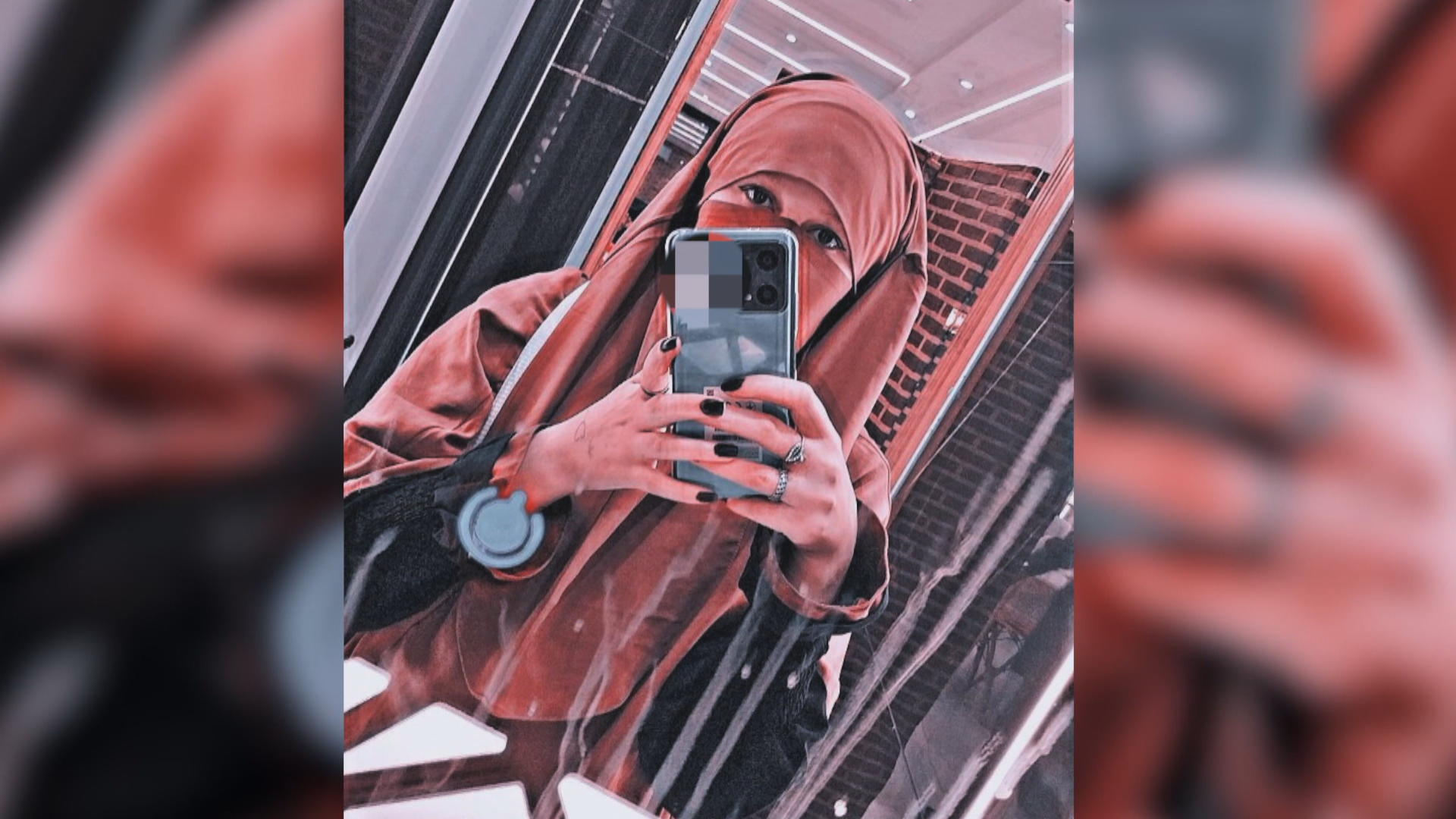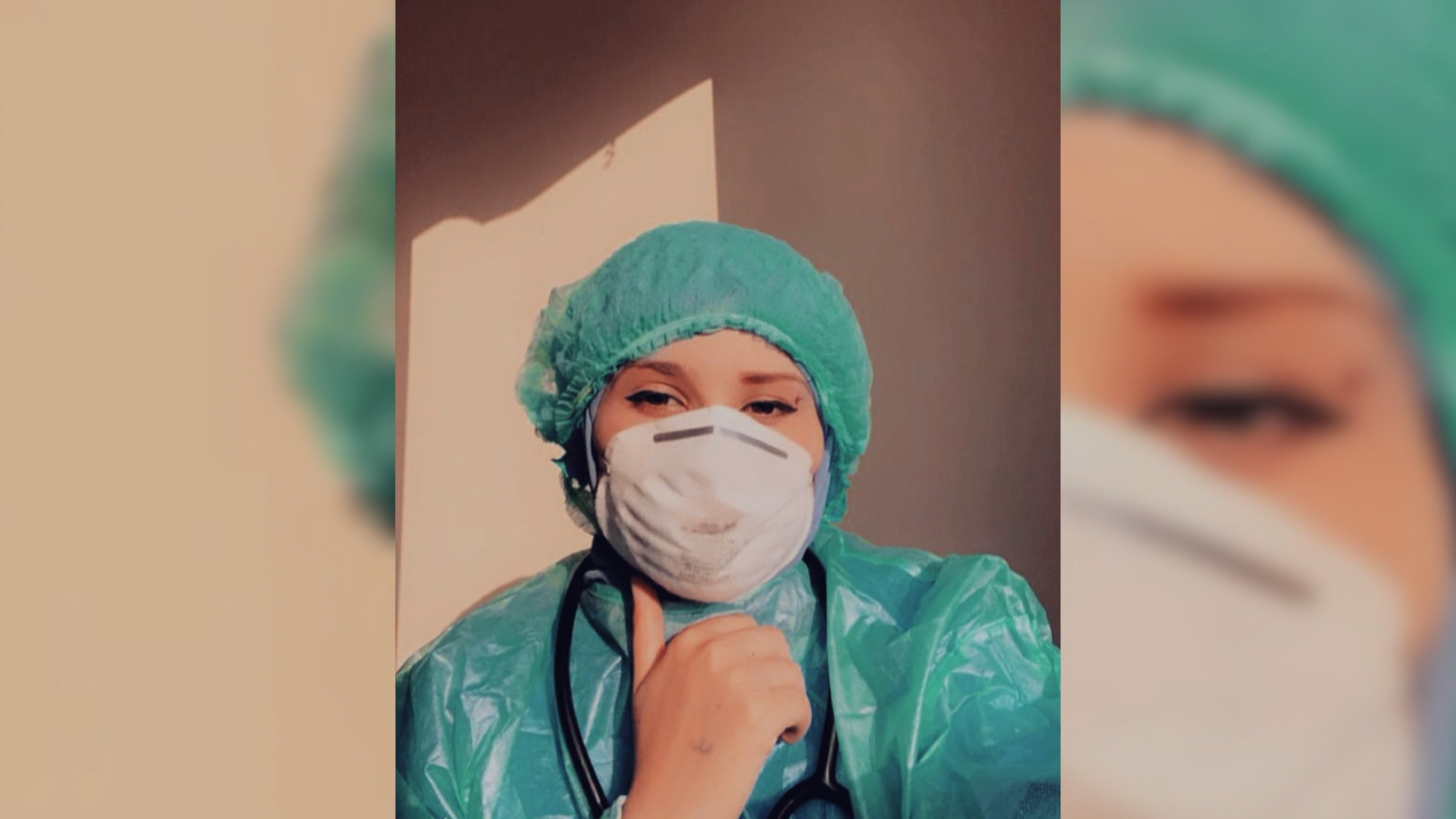ERBIL, Kurdistan Region - Mariam was just eight years old, a child who liked spending the hot summer days playing with her friends or her brothers in the Yazidi heartland of Shingal in 2014 when fighters from the self-proclaimed Islamic State (ISIS) stormed their town. She was one of thousands of Yazidi girls and women abducted by the militants. Under ISIS rule, she was forced to marry a member of the terrorist group and raise two of his orphaned children in his Palestinian hometown.
Wearing a black abaya covering her entire body, Mariam, a pseudonym, told Rudaw's Nasir Ali her story over Zoom on Sunday. She recounted her nine-year journey from Shingal to Palestine, during which she suffered violence, injustice and rape.
When ISIS took control of Shingal, the terror group abducted 6,417 Yazidis, including 3,548 women and girls. So far, 3,570 of them have been rescued, according to the latest data obtained by Rudaw English from the office to rescue the missing Yazidis, affiliated with the Kurdistan Region Presidency.
Start of an ordeal
Mariam and her two brothers were visiting their uncle the day ISIS attacked.
“There were nine of us. Two of my brothers and I were at my uncle’s house. We were all captured together. Other members of my family were able to escape. ISIS captured my brothers and me. Then we were taken to a distant place where we stayed for around one year. My brothers were separated from me. My separation from my brothers really hurt me and I wanted to be with them,” she recounted. She now believes she spent nearly a year in Tal Afar, between Shingal and Mosul.
Her brothers were aged seven and ten at the time.

“They took my brothers, but I do not know what they did to them,” she said. Mariam later found out that her brothers had managed to escape.
“All the girls were taken to a place. I was able to speak with my parents [on the phone] and they told me that my brothers had reunited with them. I tried to escape too, but I could not because I was too young.”
From Tal Afar, she was taken to Raqqa in Syria where she saw other Yazidi girls and women being sold to ISIS militants and spent time in prison, waiting until she reached puberty and could be married off.
“I remained in prison for two years,” she recalled.
Forced marriage
A family decided to take her in until she reached puberty. Soon they told her that she should get married but she refused, telling them that she would get married only when she becomes an adult. The family, however, insisted.
A man came to ask for her hand. His appearance was terrifying, she said. “He was fat, long-haired and long-bearded. I was really terrified after seeing him and I had nightmares about him.”
After she refused to marry, the family took her to a place where women and girls were sold.
“A good person came. He said that he would adopt me as his daughter and take care of me until I grew up and got married. I stayed with him for two years. Then, their [ISIS] emirs said that I should get married.”
One young Syrian man wanted to marry her, but his mother refused because she did not want her son to marry a kidnapped woman.
Then a 24-year-old Palestinian man asked for her hand. They were wed although it was technically illegal to marry off a ten-year-old child.
“They told the court that I was 16 years old because they [judges] would not approve the marriage had I said I was ten. They prepared a marriage bond and bought me gold in the market,” said Mariam. The groom’s family threatened her not to reveal her true age.
“I did not want the marriage and I was too young but they would not understand because my Arabic was poor. I didn't even know what marriage was,” she recounted.
First night of marriage
Mariam and the Palestinian man lived in a house in Raqqa.
“I was taken to a house where he and I were staring at one another. It was a strange feeling. I did not know what was going on. I did not know what marriage was. Evening came and the man knew what he was doing, but I did not. He asked me to go to bed but this experience was very strange to me. I did not feel good at all,” she said.
“I then realized that he was going to rape me. I knew that I was young but he was an adult, so I would not endure it with him… He said that he was not going to forcibly sleep with me and that he would do it only when I was ready.”
Mariam did not trust him. She told him that she wanted to sleep but he said she had to wait a bit. She went to the bathroom, pretending to take a shower for two hours until he nodded off. “I went to another room and slept. The next day, I cried and told him that I was not ready for marriage. He said that it was an order from the emirs. He did not force me that day.”
Mariam asked him to take her to a place where some other Kurdish women lived. Even though she did not know any of the women there, she wanted something familiar. Her husband allowed her to visit for one day and promised to take her back the following month, but he never did.
“He told me that I had to sleep with him. On the third day, he went to a pharmacy and brought a drug that numbs part of the body. He gave me the drug and I cried,” Mariam recounted, saying the rape emotionally hurt her.
He tried to have sex with her every day but she resisted because she could not endure it.
Preteen mother
One year later, she gave birth to a son. Her entry into motherhood changed her life.
Two months later, her husband took another wife, an Arab woman, and he began to get violent with Mariam, beating her. Two months after the birth of her son, she got pregnant again, this time with a girl.
The man moved the family to Baghouz, the last redoubt of ISIS in Syria.

In late 2018, the Kurdish-led Syrian Democratic Forces (SDF) intensified its attacks against ISIS, especially in Baghouz. Mariam and her ISIS-affiliated family struggled economically in the town which was under a siege imposed by the US-backed Kurdish forces.
The family later moved to the nearby al-Suda on the Iraqi border.
Mariam stayed with her Palestinian husband until the SDF declared the territorial defeat of ISIS in Syria. The SDF moved Mariam and her son to al-Hol camp in Hasaka, northeast Syria (Rojava). Around 50,000 ISIS-affiliated women and children are still held in the notorious camp.
Mariam stayed in contact with her husband while in al-Hol.
She found a way to leave the camp two months later and moved to the rebel-held Idlib province in northwest Syria.
She went into labour in the car on the road to Idlib. Four men and a woman were also in the car. They tried to stop at a mosque run by Shiite Kurds who refused to allow Mariam to give birth there. So her daughter was born in the car, with help from the other woman traveling with her.
In Idlib, she lost contact with her husband and later saw a video reporting him dead.
Mariam still had contact with her husband’s family in Palestine. They smuggled her to Turkey where they issued fake passports for her and her children.
Palestine
After eight months in Turkey, Mariam and her children traveled through Egypt and finally arrived in Palestine’s Nablus.
The Yazidi girl said the family of her husband were good to her. They rented her a house in the same city and financially supported her at the beginning. After her husband’s family stopped supporting her, Mariam depended on the generosity of a philanthropist.

Whenever Rudaw asked about her faith, she would glance around nervously. She was wearing an abaya covering her body and a niqab over her face. She initially had not wanted to be interviewed by a man, saying this would go against Islamic Sharia law, which does not allow a woman to speak with people who are not members of her family.
When asked why she was following the strict rules of Islam, she said it was not related to her faith but the tradition of Palestinians. Mariam said she could remove her niqab if she returns to Shingal, but not now, where she is living.
The Free Yezidi Foundation, a leading Yazidi rights organisation, told Rudaw English that “We do not have any statistics on Yezidis taken [to Palestine].”
The office rescuing missing Yazidis declined to give figures on the number of Yazidis who have ended up in Palestine after they were kidnapped by ISIS, citing the sensitivity of the subject.
The office said that 550,000 Yazidis used to live in Iraq and Kurdistan Region before 2014. Now 135,860 are living in Kurdistan Region’s IDP camps and 189,337 others live in areas disputed between Erbil and Baghdad. Some 120,000 have left the country.
The office is still working to rescue more than 2,500 Yazidis still missing. The rescues are widely celebrated by Yazidis and around the world.
Return to Shingal?
Asked if she is willing to return to Shingal or Kurdistan Region, Mariam said she definitely wants to, but not now.
“I want to return but not until I make sure my children are safe and secure,” she said.
The children of Yazidi mothers and ISIS fathers has been a controversial issue in the Yazidi community. For some, they are a reminder of the genocide and under Iraqi law, they would be considered Muslim. Yazidi spiritual leaders in 2019 decided children born of rape by ISIS militants would not be welcomed into the faith.
Mariam said sorrowfully that she really misses her mother.
“I miss my mother the most. When I see other girls spending time with their mothers my feelings get hurt. There is no one I can call ‘Mommy,’” she said.
She has five brothers and three sisters and often speaks with her family, except for her brothers, who currently live in the Kurdistan Region. Her family has asked her to return to Iraq.
She has dedicated her life to raising her children and is going to school in Nablus with the hope of building a different future for her small family.
Mariam had many dreams when she was a child in Shingal, but after experiencing war she wants to become a doctor.
“I have seen many people get injured. I want to become a doctor and cure the injured.”










Comments
Rudaw moderates all comments submitted on our website. We welcome comments which are relevant to the article and encourage further discussion about the issues that matter to you. We also welcome constructive criticism about Rudaw.
To be approved for publication, however, your comments must meet our community guidelines.
We will not tolerate the following: profanity, threats, personal attacks, vulgarity, abuse (such as sexism, racism, homophobia or xenophobia), or commercial or personal promotion.
Comments that do not meet our guidelines will be rejected. Comments are not edited – they are either approved or rejected.
Post a comment